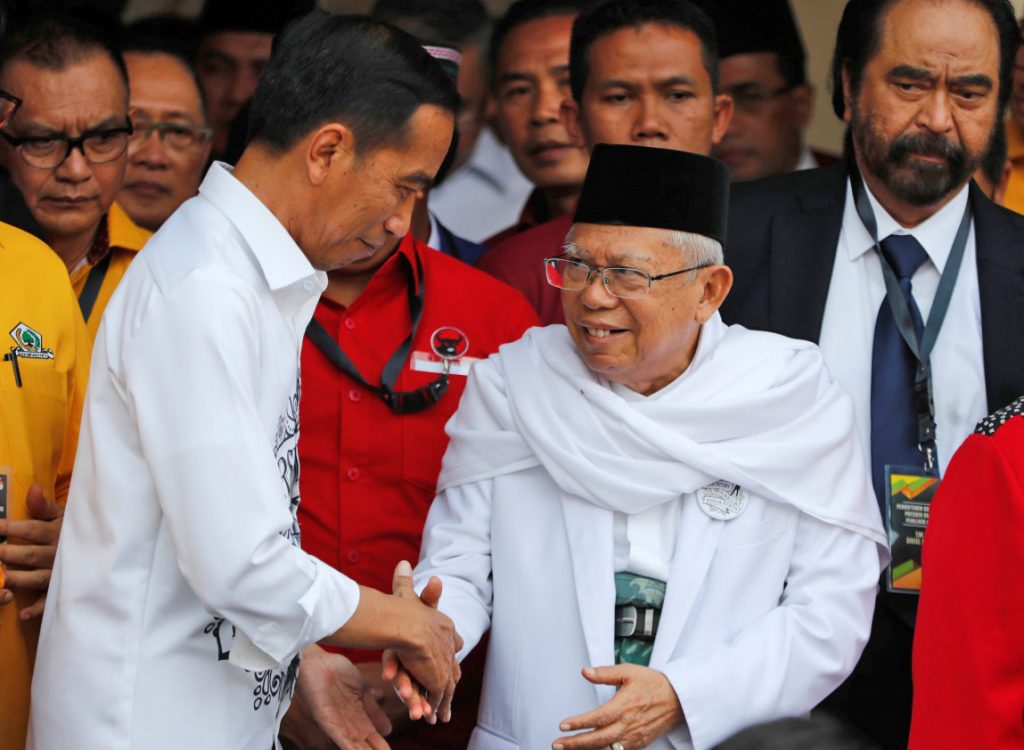Australia/Israel Review
Asia Watch: Choice of necessity
Sep 4, 2018 | Michael Shannon

In an election that will feature the same contenders as last time, Indonesian President Joko Widodo and opponent Prabowo Subianto both waited until the August 10 deadline to surprise many with their choice of presidential running mates.
It could be said that a surprise is no surprise in Indonesian politics – renowned for its complex behind-the-scenes horse-trading – but both contenders chose running mates who address their perceived vulnerabilities. For “Jokowi”, it’s Islamic bona fides; for Prabowo, it’s youth appeal and money.
Jokowi had been widely expected to name Mohammad Mahfud, popularly known as Mahfud MD, the former chief justice of the Constitutional Court and a highly respected academic. Instead, to the bewilderment of many supporters, he chose Ma’ruf Amin, the supreme leader of the central board of Nahdlatul Ulama (NU) the major Sunni organisation in the country, and chairman of the Indonesia Ulema Council (MUI), the country’s top Islamic clerical body, which helps shape government policy in Islamic matters. Its board comprises representatives of all of the country’s Sunni Muslim organisations.
The 75-year old cleric has a long history in religious and political affairs, going back to the birth of president Suharto’s New Order era in the early 1970s, including stints in local and national legislatures for the Islam-oriented United Development (PPP) and National Awakening (PKB) parties, as well as serving as an adviser to the late President Abdurrahman Wahid (1999-2001).
However, Ma’ruf came on to the MUI in the mid-2000s as then-President Susilo Bambang Yudhoyono (SBY) elevated the body to pre-eminence – a role which saw the MUI issue an edict in 2005 against secularism, pluralism and liberalism; an inflammatory 2008 fatwa banning the teachings of the Muslim sect Ahmadiyah; as well as edicts against pornography, Valentines Day and even opposing Muslims attending Christmas celebrations. As MUI chairman (since 2015), Ma’ruf was a prosecution witness in the blasphemy trial last year that sent ethnic-Chinese Christian former Jakarta governor and staunch Jokowi ally, Basuki “Ahok” Tjahaja Purnama, to prison for two years.
There has long been a whispering campaign that Jokowi is either not a Muslim or not a very good one. It appears that coalition considerations forced his hand, particularly pressure from the PKB, the NU’s unofficial political arm. The day before the announcement, NU executive Robikin Emhas stated that “If the vice presidential candidate is not from among the NU’s ranks, then the [NU followers] will feel no moral responsibility to help [Jokowi] win.”
Meanwhile, Prabowo has paired up with onetime playboy turned newly devout Muslim, Sandiaga Uno, who left his lucrative career as a business magnate to become deputy Jakarta governor in a 2017 race that was defined by bitter Islamic opposition to the sitting governor Ahok.
Sandiaga was educated in private Christian institutions in Indonesia and later at George Washington University in the United States. Now 49, the avid marathon runner has the youth appeal that Prabowo conspicuously lacks – a major consideration in a country in which nearly half the population is aged less than 30.
With his history in banking and resource companies, Sandiaga is one of Indonesia’s richest businessmen and has already declared a willingness to provide funds for the campaign. Claims have been made that he effectively bought his way onto the ticket by pledging to give Rp500 billion (US$34.6 million) to each of the two Islamic parties backing Prabowo, the National Mandate Party (PAN) and the hardline Prosperous Justice Party (PKS).
Financially crippled by the fortune he spent in the 2014 race, Prabowo has often acknowledged he is short of funds to mount a credible challenge to Jokowi. His businessman brother, Hashim Djojohadikusumo, is reportedly unwilling to repeat the financier role he played in 2014; while media tycoon Hary Tanoesoedibjo deserted him last year for Jokowi’s camp.
The availability of Sandiaga enabled Prabowo to rebuff a push by the Democratic party and former President Yudhoyono to place his 39-year old son Agus Harimurti Yudhoyono (AHY) on the ticket. SBY, too, promised money and political clout but evidently not enough to overcome the memory of AHY’s lacklustre third place in the Jakarta gubernatorial race last year.
The strained personal history between Prabowo and SBY cannot be discounted. As chief of staff for territorial affairs in 1998, SBY sat on the panel that drummed Prabowo out of the armed forces for alleged insubordination following former president Suharto’s fall from power.
It’s no surprise that both candidates have sought to secure their flanks in an election season likely to be fanned by social media storms. Indonesia now has 79 million active social media users. Nearly 90% of these are below the age of 34. This, in a climate identified by ongoing surveys as increasingly intolerant, featuring widespread politicisation of religion and race, mutual disbelief, and discrimination against and persecution of minorities.






